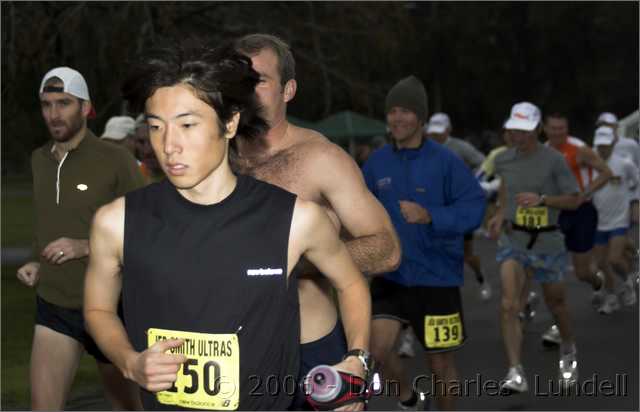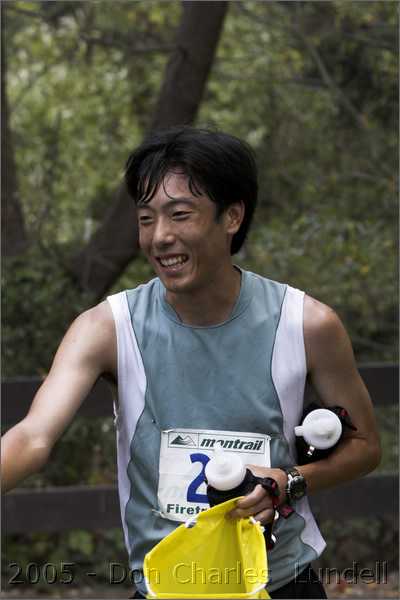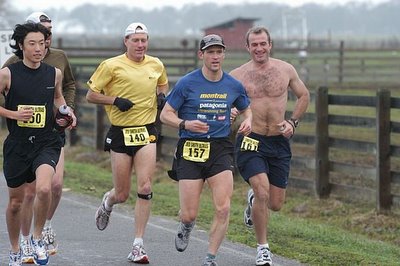|
|---|
Sunday, February 26, 2006
In 2005, 23-year-old Chikara Omine exploded onto the ultrarunning scene. After a successful collegiate career running for SF State, Chikara found a new challenge in the hilly California ultras. He started 2005 with a sub-4 hour finish at the Skyline Ridge 50k (the first ever sub-4 finish on that course, even breaking the 37km course record at his split), then went on to set age group records at the Golden Gate Headlands 50k/USATF championships (4:03, 4th overall), the Firetrails 50 miler (7:04, 2nd overall, his first 50-miler), and at the Helen Klein 50 miler (2nd overall) with a screaming fast 5:47 (think about that – that’s like two sub-3 hour marathons back to back!). In addition, Chikara placed 5th in the San Francisco Marathon, clocking 2:38. With a clean sweep of age group firsts in some of the area’s most difficult ultras, Chikara won his PA/USATF age group championship at almost a 2x margin his first year out.
photo for purchase from the amazing Don Charles Lundell)
I caught up with Chikara as he trains for the 2006 season, where he has already won the Angel Island 50k (3:57) and the Jed Smith 50k (3:22!). He’s now setting his sites on the Way Too Cool 50k and Western States and any fun race in between.
First, congratulations on an outstanding season! Did you have any idea you would do so well in your first year in ultras?
Thanks Scott! I actually had no idea how my season would go. All I knew was that I love to run long and that I enjoy trails. Like many ultrarunners in my area, I set my goal to run Western States in sub 24 hours; but first I had to worry about running a qualifying time and getting through the lottery. After finishing my collegiate running, I actually started my 2005 season with the Mt. Diablo 50k, put on by Pacific Coast Trail Runs (PCTR). I can’t say that I had a great race there, but I still had “serious fun.” I also got my butt kicked by Andy Jones-Wilkins, who was running it as a training run, 3 weeks before his outstanding performance at Western States.
Your name is very unique. Is it a family name? What is your heritage?
It is a Japanese name. Both my parents are Japanese. I was born and raised in San Francisco though. Being only 120 pounds, I usually feel embarrassed letting people know that “Chikara” means “strength.” Strength to run maybe? I definitely don’t have physical strength my parents wanted me to have when they named me. It’s at least kind of neat to have a name that stands out.
You ran for SF State, yes? What events did you compete in?
Yes I did. Cross-country was my favorite but I also ran track. I competed in the events that are 1500m and longer. My training was focused on the 10k, but my favorite event is the steeple. Even though I am no good at hurdling barriers, I love how the race requires variation in pace. Unfortunately SF State lost its men’s track program last year. At least on my final year for cross-country I got coached by arguably the top (distance) runner in San Francisco at the time, Chris Lundstrom. He was a great role model and I learned a lot about training from him. He moved to Minnesota last June.
How has your training changed since switching to ultras? Do you still do the speed training required for those shorter distances?
Yes it has changed. I have been focusing on longer runs and less on speed. During my 2005 season, I mostly did long runs for endurance and entered some road and cross-country races to maintain some foot speed. The few speed workouts I did were usually fartleks, tempo runs, or mile repeats (can also be repeats of ½ mile to 2 miles). Hardly anymore 400 meter repeats for me anymore. Most of the time I am forced to do slower runs to recover from one ultra and get ready for another one.
I am now realizing that long runs are helpful, but they leave me too tired to put in quality workouts. Some speed workouts are necessary in order to feel comfortable at a good pace. I plan to have some weeks where I back off the mileage to do workouts and other weeks where I don’t do workouts and focus on longer runs.

photo for purchase from the amazing Don Charles Lundell)
When did you start running? When did you do your first trail runs?
I started running on my junior year of high school when I was 16 (1998). Before that, the only running I did was the mile or 2 mile for gym class or a race down a block or blocks against my friends. I usually did better in the 2 mile than the mile (compared to others who are also untrained), and the energy and excitement I displayed on my races down a block made people believe that I can run forever. I was encouraged to join cross-country, but it turned out that the “forever” was only 5 miles when I first started. After I learned about marathons and later about ultramarathons, I set new goals.
My very first ultra was the Distance Classic hosted by the Dolphin South End Running Club when I turned 17. It was a 12-hour run around a ¾-mile flat dirt field (now it’s only a 6-hour run). The concept of doing circles sounds boring but completing each lap brought excitement, as I realized that I am advancing further in distance. By mile 35 I injured my knee and had to walk often. Later I received many more injuries. Near the end I was so beat that on the last 3 hours I only completed 5 miles. After the race ended, my only thought was, “I can’t wait to come back again and try to beat my mark.” The cross-country practice 2 days after however, was not pleasant.
Later that year I ran my first trail run at the Double Dipsea (13.7 miles) also hosted by the DSE. I used to do most of the DSE races back then. I arrived at the race 30 minutes late, struggled on the hills/stairs, and finished close to last, yet I had a blast.
What is it about ultras and trail running that makes it so enjoyable for you?
I can’t say that running is always enjoyable. There are many days where I realize that it’s tough to be motivated to run everyday, and get tempted to skip a training run. Yet I run anyways, reminding myself that if I don’t train, there will be fewer days where it feels good to run.
I loved running ever since I started. It’s a great way to release all the stored energy. I believe that the longer I run, the longer I get to enjoy it. Races are fun, but I feel that some end too quickly. That’s not a problem with ultras. Later, I gave hilly trails a try and found something that made running even more enjoyable. The terrain on trails makes me constantly change pace, which I believe is more fun than trying to keep a steady pace on a road or track race. On top of that, the scenery on trails is much more enjoyable. Combine ultras with trails and that creates an ultra-fun event! After exhausting myself to complete an ultra, it feels unbelievable good to just relax and eat. I still like the short road races too, but ultras on trails are my favorite.
What inspires you to keep up the training?
One night during the winter I remember it was raining hard and it was cold and windy. From the window I looked into the dark night and saw that some of the streets are flooded enough to completely soak the shoes. I wanted take a day off, until I thought about what my coach (Chris) would do. I told myself “I bet that Chris would be running out there right now,” and off I went. Sure enough the next day, I found out that my coach was out running at around the same time. Runners train hard and I’m pretty sure many of my rivals are no exception. Some runners I’ve met hammer on their runs/workouts then come back the next day to do it again. Those types of runners get me motivated and give me inspiration. Sometime the hardest workers I’ve seen are not the fastest, but I am always more inspired by the efforts people give than their natural ability to run fast.
Do you train with a running club, or have a group of other ultrarunners you train with?
I run with the New Balance Excelsior. The club’s focus is not on ultra running so I don’t really train with other ultrarunners. On weekdays I usually train on my own. The club has some weekend trail runs that I like to do. Occasionally the club has workouts on Tuesday and Thursday, and I join them on those as long as my schedule allows it. Mostly I just like to run road and cross country races with the club. It makes running a lot easier and a lot more fun when you run for a team.
Do your workmates think you are crazy? What kind of work do you do?
At work I am always eating junk food and my workmates thought that my eating habits were crazy. When they found out I run ultras, they were more like, “oh, now your diet makes sense.”
Currently I am a student at SF State and only work part time as an accounting assistant. I plan to stay in the accounting field after I graduate.
Lastly, a few training questions. What’s a typical training week look like for you? How many miles? Is your ’06 training different than ’05?
During my base training, I like to run between 100-110 mile weeks with some 60-80 mile weeks to back off. I do it off of daily runs of 13-18 miles. I usually like to spread my mileage evenly through the week. Every once in a while I will run a week higher than my usual range.
Once I start adding some workouts I lower my mileage anywhere from 50-80, but at a faster pace. I do long runs on weekends and usually 2 interval or tempo/fartlek workouts during the weekday with easy runs for recovery. Half of the time the workouts are done on the track or flat road, and half the time it’s done on hilly courses. If I have a race on the weekend, (non-ultras) I finish off with a long cool down. The week after and before an ultra, I usually back off training with a 40-50 mile week.
 (Chikara in the front pack of the Jed Smith 50k, along with
(Chikara in the front pack of the Jed Smith 50k, along withquad-monsters Mark Lantz [4th overall], Kevin Sawchuk [6th],
and Erik Skaden [2nd]; photo courtesy of Pete Zinsli)
What are your favorite foods/race snacks?
When it comes to favorite foods, I am a junk food maniac. My favorites are pizza, hot dogs, bacon, burgers, various potato chips, nachos, krispy kreme donuts, chocolate bars, sodas, energy drinks and most things that are high in sugar. I usually cut back on my junk food a couple of days before a road race. I don’t know if it’s just my superstitious belief, but pasta and baked potatoes seem to be the magic pre-race meal for any race. However, I’ve had some good races (usually not the road races) eating pizza the morning or the night before the races. Junk food is the easiest way to get the calories I need.
For foods during ultras, I like potatoes, the pb&j pieces, chips or pretzels, and gummy bears if available. Ideally I would grab as many of those finger foods as possible, but I take GU gels if I want to save time. My favorite aid stations so far are the ones at the PCTR races. They have all my favorites for refueling during a race.
One of the best parts of ultra running is the post race meal. If you’ve never run an ultra, you can’t imagine how good food tastes right after you finish. You can eat all your favorite foods to replenish your energy. My recommendation: A slurpee from 7-Eleven and lots of pizza!
Another pizza maniac like me! I agree, few things taste better. A lot of the blog readers love to hear about “lessons learned” (ie, things that didn’t go right that perhaps they could avoid). Any you would like to pass on?
Mt. Diablo, my first 50k race, made me learn my lesson the hard way. I knew that trails are difficult and would make a 50k seem much longer; yet it’s amazing how easily I forget when I actually run the race. I pushed the pace too hard too early thinking that I’ll be fine as long as I go easier than my marathon pace. I also skipped many aid stations thinking they were unnecessary. Of course, I bonked and could not run a minute without walking. Before long, I couldn’t even walk straight and just had to sit. Luckily the food at the final aid station saved me and allowed me to finish.
The only good thing about learning a lesson the hard way is that it is the most effective way to learn a lesson. Two weeks later I had a better idea about pacing and taking advantage of every aid station. I ended up running well at the Skyline Ridge 50k.
Any tips you would like to pass on to somebody trying their first ultra?
The usual tips are to eat right and train hard. I ‘d also like to add, “go out there and have fun.” Think of “having fun” as the main goal, and placing well or running a fast time as bonuses. You aim for the bonuses, but you make sure you satisfy your main goal first. Achieving your goal is easy so you can relax and run a smart race. If you still run a bad race, as long as you had fun you will be eager to continue with ultras. Another tip I’d like to mention is to remember to thank the volunteers. Without them, we wouldn’t be able to run these great races.
What’s next on the race/run agenda? Do you plan on doing more/less races next year, or try different races?
I kind of like to enter races on impulse and never really have a set schedule. Sometimes I decide to run a race the night before. The only races that are set for me this year are Way Too Cool 50k and Western States 100 (I got in this year!). My plan is to run fewer races to prepare for Western. I plan to enter other ultras for hard training runs. The rest of the races I will be doing are the PA road races (marathon and shorter http://www.pausatf.org/). After Western I plan to make my racing schedule similar to 2005.
Best of luck in your Western States debut! Thanks for a great interview!
SD
Labels: interviews













